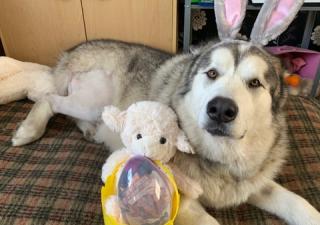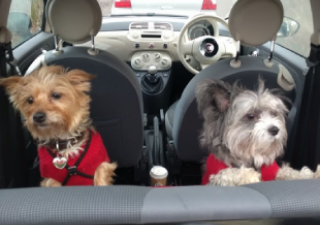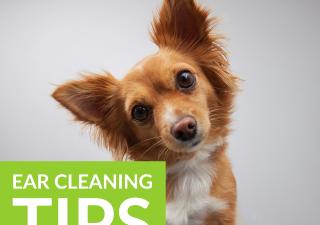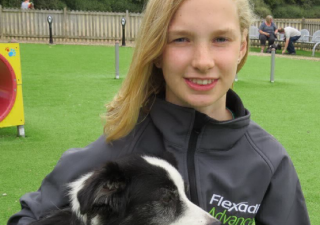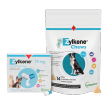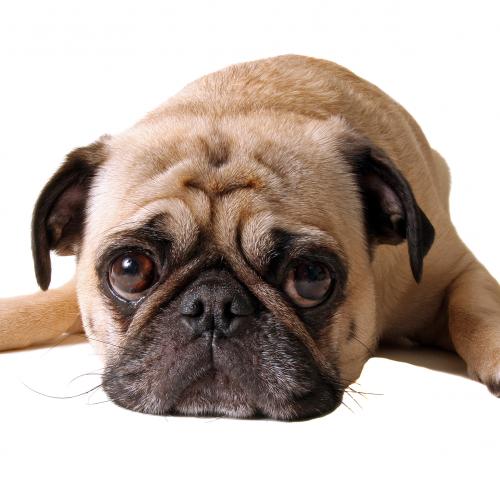
My dog is afraid of fireworks – what should I do?
Back to overviewMy dog is afraid of fireworks – what should I do?
Dogs can be taught not to be worried by fireworks through a training process called desensitisation and counter conditioning. However, for this to work it is important that your dog only hears fireworks during the training sessions. It is therefore best to wait until the firework season is over before starting the training. In the meantime there is a lot you can do to help your dog cope with the firework season.
Keeping your dog safe
Dogs that are afraid of fireworks can sometimes become quite panicked. It is therefore important to take steps to ensure your dog cannot hurt him or herself if they react badly. Walk your dog before dark and if you take them out to empty their bladder or bowels once the fireworks are over keep them on lead in case there are any late ones. Ensure windows and doors are closed whilst fireworks are being let off so your dog cannot jump out of a window or bolt from the house if he or she panics. Also avoid doing anything your dog is bothered by e.g. if your dog is fearful of the vacuum cleaner then avoid using this at the same time as the fireworks.
Aim to stay with your dog during any expected fireworks
Not all fireworks are predictable but many are, such as around celebrations that traditionally involved fireworks and bonfire night parties. Fearful dogs cope far better if they have their owners with them. It is therefore best to make sure you are at home with your dog whenever there are likely to be fireworks.
Drowning out sounds
Aim to drown out the firework sounds as much as possible. Settling your dog in a room with plenty of soft furnishings and closing the curtains can go a long way to muffling sound. If you do not have heavy curtains then hanging a blanket or quilt over the window may help improve sound insulation. Make sure the room is well lit so they do not see flashes, and try watching TV with the volume turned up a little, playing music with a rhythmic beat or putting on some white noise such as an electric fan.
Should I pay attention to my dog if he or she is scared?
Dogs are strongly social animals and are known to look to others in their social group, including their owner and other dogs they live with, when deciding whether something poses a threat or not. They will also seek reassurance from others if they are scared.
It is fine to offer your puppy or dog reassurance if they are seeking it. Often cuddling up to you or a calming hand can go a long way to helping your dog cope when he or she is feeling afraid. When doing so keep in mind that your dog will be guided by your own mood and behaviour when deciding how much danger the noises pose. It is therefore important that you remain calm and relaxed around your dog, and that you pay no attention to the noises, so your dog can see you don’t think there is anything to be worried about.
It is sometimes suggested that owners should ignore their dog if they show signs of being afraid, so they don’t ‘reward’ their fear with attention. Dogs can’t choose whether to be fearful and so it isn’t possible to ‘reward’ fear or for the dog to choose to feel fearful to get extra attention. Even if they could – it is very unlikely they would! However, ignoring is a strong punishment, especially to a fearful dog. As a result of ignoring your dog they may become more worried by the fireworks, as they will start to link them with being ignored by you. It is therefore important not to ignore your dog.
Providing a refuge
Whilst most dogs will prefer to stay close to you if they are worried, some may prefer a hiding place. Left to their own devices they will often hide in the back of cupboards or under beds. You can help by ensuring your dog always has access to a place they feel safe in as close to you as possible when there are fireworks.
Create a refuge that is large enough for your dog to stand up and turn around in, but small enough to feel cosy. This can be a crate, cosy cupboard or a piece of adapted furniture e.g. a small side table next to your armchair. Cover it on all but one side so it has a cave-like feel and drowns out noise, and line it with thin layers of blankets so your dog can hide underneath them. Rotate washing the blankets so that you can balance maintaining hygiene with ensuring at least one of the blankets has your dog’s own reassuring scent on it all the time. It may also help to put something you have had close to your skin in the refuge, such as an unwashed T-shirt or pillowcase. This will be particularly reassuring if fireworks unexpectedly happen when you are not there.
Set the den up at least a week or more in advance of anticipated fireworks so your dog has already become familiar with it. Encourage him or her to use it by putting toys and treats in or feeding in the den. Make sure your dog always has access to it, especially when you are out, but is never trapped in it. The den is intended to be a refuge in which your dog can get away from the scary noises. Locking him or her in would increase their fear as they would feel trapped and so unable to get away from the threat.
Would it help to use pheromones or products intended to reduce anxiety?
Pheromones and products intended to ease anxiety can be very useful when helping a dog cope with fireworks. For more information see the blog ‘Are there any products that can help my dog relax during fireworks?’.
What do I do once the firework season is over?
Once the season is over you can take steps to teach your dog not to be fearful of fireworks using sound recordings. How to do this is discussed more in the blog ‘My dog is afraid of fireworks - what should I do?’ If your dog is strongly fearful and you can’t seem to be able to help him cope then seek the advice of a Clinical Animal Behaviourist as soon as possible.
Stephanie Hedges BSc (Hons) CCAB
Canine Behaviour Counsellor
Full member of the Association of Pet Behaviour Counsellors
ASAB Certified Clinical Animal Behaviourist (CCAB)
Animal Behaviour & Training Council (ABTC) Registered Clinical Animal Behaviourist
Tips & Tricks
- Easter is a wonderful time of year with so many chocolate Easter eggs in abundance, but make sure you do not let your pet near them.
- With Brexit deal still in negotiation and a possibility of a ‘no deal’ scenario, there are no concrete answers just yet – but to help you become more informed, here is our Q&A on what we can find so far.
- Build-up of wax and debris in your pet's ear canals can lead to discomfort and irritation. Cleaning your pet’s ears can have a lot of benefits and here are some tips to get you started!
- We had a great time catching up with Mariann Bayliss, our sponsored agility handler last week. We met her competing dog, Ila, and her 5 month old puppy Coral.

